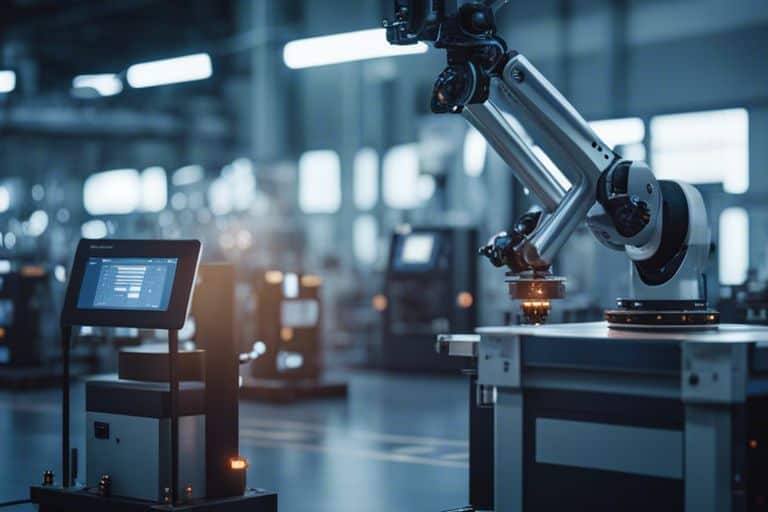Many individuals are increasingly aware of the transformative impact of smart systems in advanced manufacturing processes. These innovative technologies are reshaping how you conceive, design, and manufacture products. By integrating artificial intelligence, robotics, and the Internet of Things, smart systems enable you to enhance efficiency, improve quality, and reduce costs in your operations. In this blog post, you will discover how these revolutionary systems are not only revolutionising production but also paving the way for a more sustainable and productive future in manufacturing.
Evolution of Manufacturing
For centuries, manufacturing processes have evolved significantly, transcending simple tasks through advancements in technology and understanding. These changes have transformed how products are designed, produced, and delivered, leading to enhanced efficiency, quality, and sustainability in manufacturing.
From Traditional to Digital
From handcrafted goods to the rise of digital technology, the evolution of manufacturing has been remarkable. You now experience a landscape where digital tools enhance design processes, enabling rapid prototyping and customisation. This shift allows for innovative approaches, leading to smarter and more efficient production methods.
The Role of Automation
For manufacturers, automation plays a pivotal role in achieving increased productivity and consistency. You benefit from the integration of automated systems that reduce human error, optimise workflows, and enhance safety in the workplace.
Traditional manufacturing relied heavily on manual labour, which often led to variability in product quality and production speeds. With the advent of automation, processes are streamlined, and repetitive tasks are delegated to machines. This not only magnifies output but also enables you to focus on complex problem-solving and creative endeavours, ensuring that human ingenuity remains at the heart of innovation.
Smart Systems in Action
There’s an undeniable transformation occurring in manufacturing, thanks to the advent of smart systems that enhance productivity and efficiency. These systems are set to revolutionise the landscape of production, paving the way for innovative processes that provide unparalleled advantages.
Cyber-Physical Production Systems
To fully appreciate the impact of smart systems, one must understand the concept of Cyber-Physical Production Systems (CPPS). These systems integrate physical processes with computing technologies, allowing machines to communicate and collaborate like never before, ultimately leading to more adaptable and intelligent manufacturing environments.
Real-time Data Analytics
Data analysis is at the heart of smart manufacturing. With real-time data analytics, you can monitor processes continuously, enabling immediate adjustments for optimal performance. This capability fosters a proactive approach to production, rather than a reactive one.
A key aspect of real-time data analytics is its ability to gather and analyse vast amounts of information from various sources instantly. This not only identifies inefficiencies but also detects potential issues before they escalate, allowing you to enhance decision-making and maintain a competitive edge in the market. By leveraging these insights, your manufacturing processes become more streamlined and efficient, driving greater productivity and reduced operational costs.
Advantages and Challenges
Increased Efficiency and Productivity
The incorporation of smart systems in manufacturing processes leads to remarkable gains in efficiency and productivity. By leveraging advanced technologies, you can automate routine tasks, minimise human error, and enhance operational workflows, ultimately allowing for more rapid production cycles and reduced downtime.
Addressing Cybersecurity Concerns
Advantages in technology often come with potential risks, particularly concerning cybersecurity. You must ensure that your smart systems are fortified against potential cyber threats, as an integrated network can serve as a potential target for malicious actors aiming to disrupt operations or steal sensitive data.
Efficiency in these smart systems must be balanced with robust cybersecurity measures. As you adopt more connected technologies, understanding the vulnerabilities and implementing strong safeguards is crucial. This can include regular updates, employee training, and comprehensive monitoring to secure your operations against emerging threats whilst maintaining the advantages of improved efficiency.

Future Outlook
Predictive Maintenance and Quality Control
Predictive maintenance and quality control will revolutionise manufacturing efficiency. By leveraging smart systems, you can anticipate equipment failures before they occur, ensuring minimal downtime. This capability allows you to maintain high quality standards throughout production, significantly reducing waste and rework. As a result, your facility will operate more seamlessly, enhancing overall productivity and profitability.
Human-Machine Collaboration
Predictive capabilities in human-machine collaboration are set to redefine workforce dynamics. This synergy between human intelligence and machine precision not only increases productivity but also enriches your work experience. As machines handle repetitive tasks, you can focus on higher-level decision-making and creative problem-solving, ultimately driving innovation within your organisation.
A continuous investment in human-machine collaboration is necessary as you advance into the future of manufacturing. Emphasising training and upskilling will empower you to work effectively alongside intelligent systems, fostering a culture of innovation. Moreover, this partnership harnesses both creativity and computational power, leading to improved product design and faster time-to-market. By embracing this approach, you will ensure your organisation remains competitive in an ever-evolving landscape.
To wrap up
Upon reflecting on the intricate interplay between smart systems and advanced manufacturing processes, you may recognise the transformative potential that these technologies hold. The integration of automation, data analytics, and artificial intelligence not only enhances efficiency but also cultivates innovation in your manufacturing endeavours. As you harness these cutting-edge developments, you position yourself at the forefront of a revolution that promises to redefine productivity and quality in your industry. Embrace the possibilities, and let smart systems guide you toward a more efficient and sustainable future.
FAQ
Q: What are Smart Systems in advanced manufacturing processes?
A: Smart Systems in advanced manufacturing are integrated technologies that leverage automation, data analytics, and connectivity to enhance production efficiency and quality. These systems encompass the use of Internet of Things (IoT) devices, artificial intelligence (AI), and machine learning to analyse data in real-time, optimise production processes, and enable predictive maintenance. By integrating these technologies, manufacturers can make better-informed decisions, reduce waste, and improve operational agility.
Q: How do Smart Systems improve efficiency in manufacturing?
A: Smart Systems improve manufacturing efficiency by automating routine tasks, providing real-time insights through data analysis, and reducing manual intervention. For instance, predictive maintenance capabilities can foresee equipment failures before they occur, thereby minimising downtime and maintenance costs. Additionally, real-time monitoring helps in identifying bottlenecks in the production line, allowing for immediate adjustments to workflow. Collectively, these enhancements lead to increased productivity, reduced operational costs, and improved product quality.
Q: What are the challenges of implementing Smart Systems in manufacturing?
A: The implementation of Smart Systems in manufacturing poses several challenges, including high initial investment costs, the need for skilled workforce to manage and maintain advanced technologies, and potential cybersecurity risks. Additionally, integrating new systems with existing machinery can be complex and time-consuming. Companies may also face resistance to change from employees who are accustomed to traditional manufacturing practices. Overcoming these challenges requires careful planning, robust training programs, and often a cultural shift within the organisation to embrace innovation and technology.













